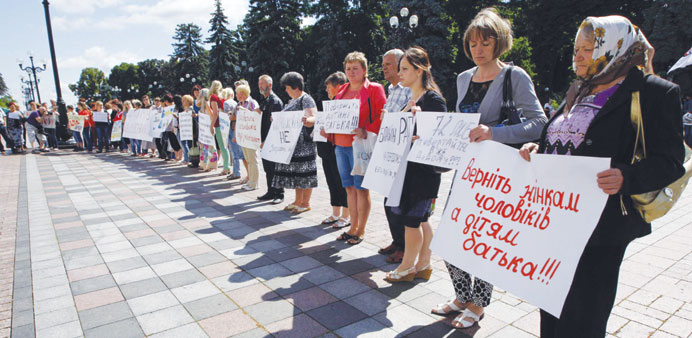AFP
Russia and Ukraine’s foreign ministers agreed in Berlin yesterday that new ceasefire talks should be held this week, as government forces battled pro-Moscow insurgents in the ex-Soviet state.
German Foreign Minister Frank-Walter Steinmeier had hastily convened the crisis meeting, also involving his French counterpart Laurent Fabius, warning that unless truce talks resume, the country could face “an explosion of violence”.
Ukrainian troops backed by tanks and bomber jets have this week again fought separatist insurgents in the country’s east, in Europe’s worst fighting in nearly two decades that has claimed over 450 lives in 11 weeks.
The latest clashes came after Ukraine’s President Petro Poroshenko ripped up a 10-day truce, which Kiev says the insurgents broke over 100 times at the cost of 30 lives. The military then announced a “massive” anti-rebel operation in the eastern rustbelt.
In their joint statement, the four top envoys agreed that fresh talks should start by Saturday, July 5 at the latest involving Moscow, Kiev, the rebels and the Organisation for Security and Cooperation in Europe (OSCE).
The goal would be “reaching an unconditional and mutually agreed sustainable ceasefire”, they said, also calling for the release of hostages, the protection of journalists and full Ukrainian control of its border checkpoints with Russia.
“An explosion of violence can occur at any time that can’t be controlled politically or militarily,” warned Steinmeier.
Amid the diplomatic efforts in Berlin, violence raged in Ukraine.
A spokesman for the national security and defence council in Kiev said militias had killed four Ukrainian soldiers and wounded 10 others in separate mortar fire attacks along the Russian border.
They were the first casualties reported by Kiev in the second stage of the low-scale war. Regional officials also confirmed the deaths of four civilians in a roadside attack on their bus.
Ukraine’s acting Defence Minister Mykhailo Koval however told reporters that the military operation was progressing “according to plan. The advantage is on our side”.
Ukrainian border guards and troops with armoured personnel carriers were in control of the Dolzhansky border post which they said they retook from the rebels on Tuesday.
A bombed-out roadside cafe and the mangled remains of customs trailers provided evidence of heavy shelling, and bullet casings littered the tarmac.
A border guard official said that retaking control of the frontier with Russia was a key objective, stating that “we are moving from controlling our border to defending it”.
A rebel spokesman in the industrial province of Lugansk told Russian media that shelling by government forces had killed 10 civilians overnight. An AFP team in the region could not immediately verify the claim.
In Berlin, Steinmeier said that in the past 48 hours the situation had “dramatically escalated... and might get totally out of control”.
Foreign Minister Sergei Lavrov of Russia—which denies lending material support to the rebels—said: “Unfortunately we lost time, we lost two days, because the ceasefire was not extended.
“We got a very clear idea of the price we had to pay because of the inability to extend the ceasefire. Infrastructure has been destroyed, lives have been put at risk.”
Steinmeier cautioned that the agreement was “not a magic formula that will put everything right overnight” but said it was “an important step in the direction of a bilateral ceasefire”.
Earlier in Berlin, visiting Nato chief Anders Fogh Rasmussen charged that “Russia’s actions threaten the peace and security we have built after the fall of the Berlin Wall”.
He challenged Moscow “to reverse its course and to begin the long process of rebuilding the trust it has broken”.
Washington earlier also voiced strong support for Poroshenko, with a State Department spokeswoman saying “Ukrainian forces have a responsibility to defend their territory and their people” in the face of “aggression by Russian-backed separatists”.
Putin has charged Poroshenko bears full responsibility for the latest deaths—suggesting he had until now been willing to work with the new Ukrainian leader elected on May 25, despite the February ouster of a pro-Kremlin administration.
Renewed tensions between Moscow and Kiev would be a worrying turn of events for European leaders who will face added pressure to unleash punishing sanctions against Russia that would likely hurt their own economies.

